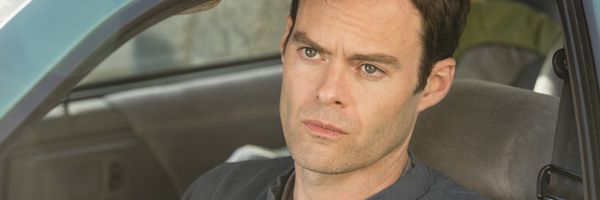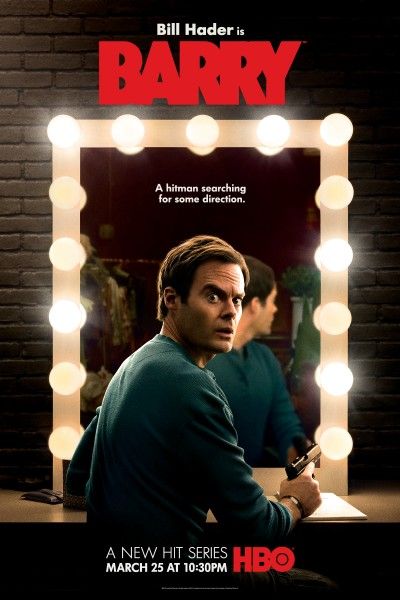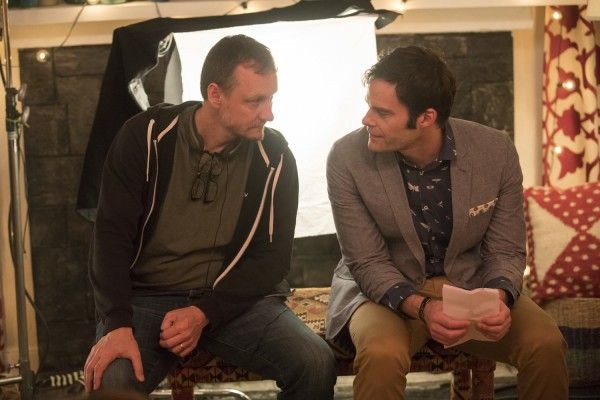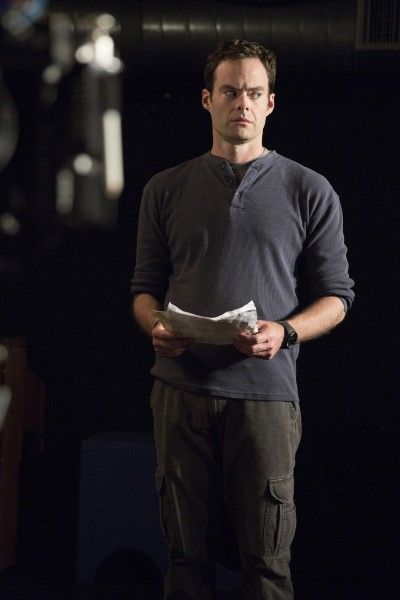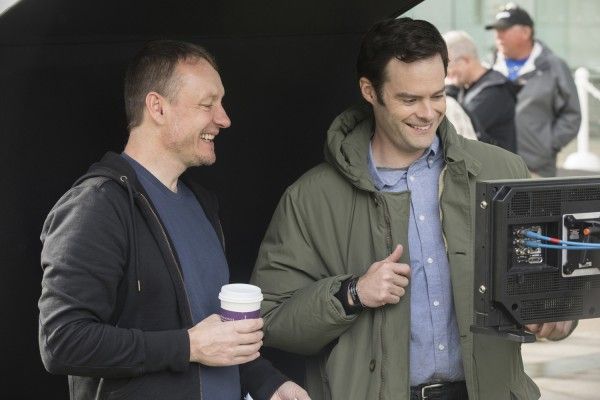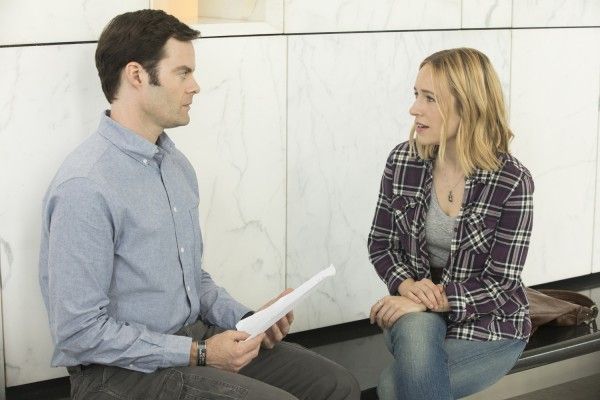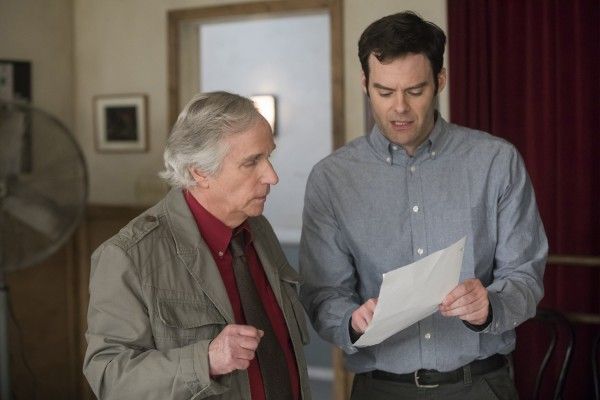From Alec Berg and Bill Hader, who serve as co-creators, executive producers, directors and writers, the eight-episode, half-hour HBO dark comedy series Barry follows a depressed hit man (Hader, in the best performance of his career) from the Midwest who stumbles onto a love of acting while on a job in L.A. Although he only ends up in the acting class by following a mark, he is instantly drawn to the group of students and their beloved teacher (Henry Winkler) and begins to question every aspect of his life of crime while trying to juggle both worlds.
Collider got the opportunity to sit down with show creators Alec Berg and Bill Hader to discuss the new series, and we talked about how the idea for Barry evolved, why this series works best as a half-hour, when they realized this crazy concept actually really works, working with such an incredibly talented and funny cast, whether his double life starts to weigh on Barry, how they’re approaching the storytelling, and the challenges of directing yourself while you’re acting.
Collider: How did this come about? Bill, did you just decide you wanted to wear every hat possible, on a project?
BILL HADER: Yeah, basically. I don’t like sleep. No, [Alec Berg and I] were paired together, by our mutual agent, and I had a meeting with HBO about developing a show, so Alec and I would just sit in a diner, once a week, in Culver City, throwing around ideas. And then, I said, “What if I played a hit man?” And Alec went, “A hit man?! No. I hate the word hit man. It’s just so dumb.” He was thinking about the skinny tie with two .45s in the hand, shooting. And I said, “No, no, no, it’d be more grounded, like a sad guy, trying to understand himself.” I was more interested in playing something that was not just totally broad comedy. I wanted to play something with a little depth to it. And then, somehow we got on acting class, and I don’t know how that happened.
ALEC BERG: I wish I could say that the idea just emerged, fully formed. But it really was like two idiots standing next to a piano, hitting each note and going, “This one? What about this one? No?” We tried to treat the hit man world like he was a traveling salesman, where this is just a crappy job that he does not like, and it forces him to travel and lose sleep and sit in the middle seat, and all this stuff. Then, all of a sudden, he realized there was this thing that was much more interesting. He had to think about, “What I hate doing, I’m really good at, and what I want to do, I might be terrible at. It also might get me killed, but I’m intrigued and I’m just going to go for it.” That started to seem like an interesting combination. You’re putting the audience in a position where they’re rooting for this guy to do something that might get him killed, and you want him to do it, but you also don’t want him to do it ‘cause it’s gonna be bad for him and you intellectually know that. That seemed fun.
This series is eight half-hour episodes. Did you ever think about doing more episodes, or doing an hour, as opposed to half-hour?
HADER: I like that aspect of it. You don’t want to take the murder and make that glib. You don’t want to make the killing funny. What he does is really fucked up and he’s a really repressed, sad person. And so, him having to find salvation in this acting class and trying to relate to all of these vulnerable people who want to make it in LA theater, we thought was funny. What else is he going to do now? He’s not a very smart guy, but he’s good at this one thing that is destroying him. When you get in the room and talk about that, you have to play with what the honest theme of that is and you’ve gotta write for that. There was the glib version of this that would have been fun, but me and the writers were like, “No, that’s sad. Let’s play that.” I thought that was what made it interesting, and that’s why you do it at HBO and you do a different thing, instead of doing a thing that I’ve seen a bunch.
BERG: I also feel like doing it as a half-hour, apart from not having to do twice as much show every week, is a nice thing because it feels lighter, in a way. I feel like, if you do it as an hour, it just feels inherently more dramatic and heavier. We liked the fact that, even though this guy is a killer and he’s doing really dark, bad things, it’s ultimately a hopeful, lighter-toned show. You get a benefit from the length, where you don’t have to bog down in this stuff.
When did you realize this was a concept that was actually working, as opposed to just being a crazy idea that you came up with?
HADER: I think when we saw the pilot cut together.
BERG: They asked for more, and we said, “What?!”
HADER: I would also say it was when we were in the writers’ room and we were getting really excited while we were writing it and going, “Okay, I see where this is going.” The first three episodes really set the stage for it, but then around Episode 5, it takes off, narratively, where you’re going, “Oh, my god!” I got really excited about it when it had that narrative propulsion to it that I like in shows, where you just want to know what’s going to happen next. When we were writing it, I was like, “I like this. This is a good show that I would watch.”
BERG: You always want to feel like, “Well, I did a show that I’m proud of. If it goes out there and people think it sucks and don’t want to watch it, okay.” If it’s a giant hit, that’s arbitrary, also. You just try to make something that’s you’re happy with, and as long as you have the DVD to show your grandchildren, that’s something.
HADER: I learned that at Saturday Night Live. Every time you tried to make something that you thought would be a hit, it always fell on its face. But when you did a thing that you just genuinely were laughing at, there would be people who loved it. You have no idea what’s going to work.
BERG: There are certain things where you just react to it and go, “I don’t know why, but I like that, so I’m gonna trust that.”
HADER: I also just like the idea of doing something that’s just honest and different. As an actor, I’m also getting to play something that I don’t normally get to play. I usually get asked to play real capital C comedies. I get to play something different and direct some of the episodes and write it. It was all things that I was really excited about doing. If I was gonna put this much time and effort into a thing, it needed to be something I thought was, at least, interesting, instead of worrying about whether people would like it.
Bill, what was it like to have Henry Winkler playing your acting teacher?
HADER: He’s great. He’s such a sweet guy, and he’s not like that character, at all, which is really funny.
BERG: Initially, when we had written the character, it was written as this very imperious, mean, angry drill sergeant, who was incredibly arrogant and condescending. And then, we just thought Henry’s version of it was so endearing and had so many interesting layers to it. It’s like, “Oh, I see, he’s being mean, but you actually feel bad for him when he’s being mean because he has such an inherent warmth and sadness.” We were rehearsing, early on, and we kept saying, “No, no, no, you have to really beat the crap out of her, emotionally, in this scene.” He was like, “This guy is a mean guy.”
HADER: He was like, “He’s a jerk!”
BERG: As soon as he got his head around the fact that his instinct would be to console her, but this character’s gotta kick the crap out of her, and he locked into that, it became super interesting. The two sides of his character, where he’s a king in this little tiny castle, and then when he leaves his castle, he’s just another out of work actor, seemed really fun to play.
It’s so fun to watch this whole group together, in the acting class. They’re all so funny!
HADER: Oh, good! We have great actors in this, that just really elevated everything. We’re really lucky to get the people in this show. I was really excited. People like Anthony Carrigan and Sarah Goldberg are really great. And D’Arcy Carden is great. Her and Kirby [Howell-Baptiste] and Rightor [Doyle], you don’t have to tell them much of anything. They just go.
How long can this guy keep these two worlds in his life separate? Does that start to become a challenge for him?
BERG: He can keep them separate for seven seasons.
HADER: I told HBO for 10-12 seasons, maybe.
BERG: Seven seasons and a movie.
HADER: Seven seasons and a couple of movies, and an all-around just development deal with gross participation. We have no idea.
BERG: It’s a very good question, and I don’t think we have any idea.
Does it weigh on him, emotionally?
HADER: Yeah, I think so. It’s awful, what he does. The more he understands himself, with this acting class, that job becomes harder. He’s effecting all these other people, which he didn’t think about before. He starts to have all of this self-realization that’s fucking with him, in a way. I don’t know. That’s what’s interesting about it.
You joked about seven seasons and a movie, but have you thought about where this could go, in the future?
HADER: We have. We did the J.K. Rowling thing, where we wrote it and put it in a safe. We have it all written and we put it in a nice little notebook, just like J.K. Rowling. We just knocked it out, over a meal. No. We do have ideas, but what’s fun about these kinds of shows is what’s gonna happen next.
BERG: I worked on Curb Your Enthusiasm, and Larry David’s whole thing was to treat every season like it’s the last season. You don’t hold back or keep stuff for next year. If you have something that works and the time is right, do it. That’s probably how we’re going to approach it.
HADER: Hopefully, we’ll get to do more. Did you like it?
I loved it! And I know a lot of other people who really enjoyed it, too.
HADER: Honestly, what Collider thinks really matters to me!
Bill, how did you find the experience of directing yourself?
HADER: It was hard, but I had Alec there. Stephen Root said that I would mouth his lines. Stephen Root stopped me once and was like, “You’re mouthing my lines.” I said, “I’m so sorry!” When we were doing a scene, Sarah Goldberg said that I flinched when she said something, so she knew that I didn’t like it. She was like, “Okay, he’s directing and acting in this scene.” It was hard, but I could go over to Alec and go, “Does that make sense?” I remember me and Stephen Root had a scene, and with the first take, I was like, “That didn’t really feel good.” And Alec came over and was like, “Well, that almost seemed like two humans talking to each other. It didn’t really work, though.” And I was like, “Yeah, I know! What are we doing wrong here?!”
A lot of it is just preparation, when you’re doing a thing that’s 30 minutes and you don’t have a lot of time and you want it to look cinematic. We had an amazing DP, Paula Huidobro, who’s just fantastic, along with our production designer, Tyler [B. Robinson], and just the whole team that we had. They just helped out, immensely, in getting this thing to look like it does. When people hear that me and Alec are doing a show about a hit man, I think they expect it to be handheld with five cameras. We were like, “I love those shows, but I’d like this to look like the movies I like.” And when you make that decision, and you’re 30 minutes and you have a story that moves along, you’ve gotta be really prepared. You have no time for mistakes or to find it. There was a lot of photo boarding and a lot of rehearsing, just getting the scenes, so that we could move in and out, and move along.
I’m really happy with how it came out, and I’m so happy with our cast. It’s so much fun, when people come in and they just surprise you and elevate you. Sarah Goldberg did that, where you’d be in a scene with her and you’d go, “Oh, god, I have to be on my A-game, or she’s gonna eat me alive!” It was the same way with Anthony Carrigan, Glenn [Fleshler], Henry Winkler and Stephen Root. You’re just like, “Oh, gosh, I have to be on my toes here!,” ‘cause they’re committed and they’re in it. When you’re wearing all of those hats, it becomes very easy to be like, “All right, let me say my lines now, whatever.” But instead, I was like, “Wait, I gotta work hard on this thing, too.”
BERG: Without being a corporate shell, hats off to HBO, as well, for the support they gave us. They gave us the time and the budget to do what we wanted, and they totally got it and were game for us to do our thing.
HADER: And not just from a production standpoint. At our first meeting, we were like, “The violence is real. It’s not funny.” And they went, “Cool, all right. I get it.” And we were like, “You do?!” We were like, “And it’s gonna be kind of sad.” And they were like, “Cool, right on, love it.” So, that was great.
BERG: Having been out of the network TV game for awhile, the problem with networks is that they keep going, “No, no, no, do that thing. Make the bimbo character dumb.” And I always think the best result you can have is, if you show somebody a pilot and they go, “What the hell is that?! I wanna watch more because I wanna know what the fuck is going on here.” That confusion is great.
Barry airs on Sunday nights on HBO.

